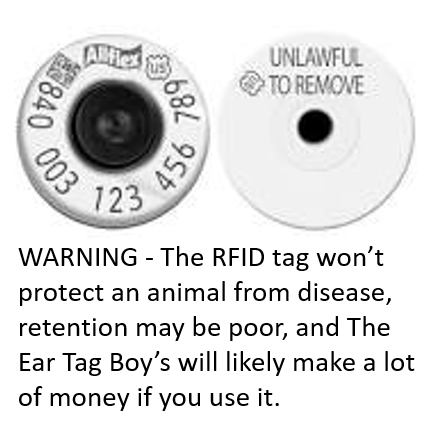By Gilles Stockton
 The boys at USDA and the National Cattlemen’s Big Business Association must be really bummed that their shares in ear tag companies have crashed along with the rest of the Wall Street economy. Last year it looked like they had triumphed in their scheme to mandate that cattlemen buy RFID tags for all of the cows. Then R-Calf went and sued USDA, crushing that whole conspiracy. The Ear Tag Boys were regrouping this winter with editorials, admonishing us ignorant cattle producers for being ignorant, but now this effort is on hold because the whole economy has fizzled because of a human disease epidemic.
The boys at USDA and the National Cattlemen’s Big Business Association must be really bummed that their shares in ear tag companies have crashed along with the rest of the Wall Street economy. Last year it looked like they had triumphed in their scheme to mandate that cattlemen buy RFID tags for all of the cows. Then R-Calf went and sued USDA, crushing that whole conspiracy. The Ear Tag Boys were regrouping this winter with editorials, admonishing us ignorant cattle producers for being ignorant, but now this effort is on hold because the whole economy has fizzled because of a human disease epidemic.
There is a lesson here. The key to prevailing over a pandemic is preparedness. I am impressed with how our medical professionals have rallied to confront a disease for which they were not well prepared. They were not ready for this particular virus but they are determined to use all of their medical skills and training. The Coronavirus may not have been anticipated, but the livestock industry knows exactly what disease is most likely to infect the cattle and we even know from which country it is most likely to come – Brazil.
There will be no excuse for not being prepared to address foot and mouth disease (FMD). Once introduced into this country, FMD will require a very rapid vaccination campaign to immunize all livestock in a ring around each point of clinical symptoms. FMD is highly infectious and strikes all cloven-hoofed animals, including deer and feral pigs. The only way to stop such a disease is to be prepared with the proper vaccine. Complicating things is that there are a couple of dozen strains of FMD, each requiring its own vaccine. However, the most likely type will be the one they have in Brazil.
The scary truth is that our national vaccine bank is nearly empty because of the Ear Tag Boy’s obsession with requiring RFID tags – a useless mandate. Once FMD is here, tracing an infected cow back to her home of origin is irrelevant because what needs doing is to look for symptoms and respond accordingly.
RFID tags are also not needed to control brucellosis or tuberculosis. The metal ear tags and hot iron brands worked perfectly well to nearly eliminate those two diseases. Brucellosis is still with us because our government is protecting the last source of infection in Yellowstone Park’s elk and bison. Tuberculosis keeps popping up because it is endemic in our neighbor to the south. The solution is to stop Mexican cattle imports, test Mexican migrant workers, and assist Mexico in eliminating tuberculosis in their country. RFID tags have nothing to do with it.
Cattle producers are not Luddites. We incorporate new technology and innovative practices in our operations when it makes sense. It is clear that RFID tags have a place in many cattle operations. Instead of obsessing about making all producers comply, the veterinary authorities should look at the steady adoption of electronic identification as an opportunity to perfect their systems.
There are all kinds of potential problems with the electronic data systems. Where will the information be stored and who should have legitimate access to it? This is not at all clear. We hear that often calves are retagged once sold. This makes no sense. What is needed are policies that require standardization. The big hole in the system is making packers keep the proper ID with the actual carcass? Unless packers do that, everything else is wasted time, money, and energy. Lastly, there needs to be a method to erase the number from the database once that animal is dead and gone?
Australia jumped on the RFID system a number of years back, without thinking these issues through. They ended up with a mess and caused a lot of expense and trouble for little benefit. Since the US cattle industry is voluntarily moving towards adopting RFID technology for reasons other than disease surveillance, all USDA needs to do is piggyback on that trend, perfecting their systems as it comes about.
It is long past time to stop arguing over RFID tags and start planning about what really needs doing – preventing the importation of FMD and preparing to do something about it should it get into our country.
Gilles Stockton
Grass Range, Montana












